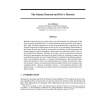Free Online Productivity Tools
i2Speak
i2Symbol
i2OCR
iTex2Img
iWeb2Print
iWeb2Shot
i2Type
iPdf2Split
iPdf2Merge
i2Bopomofo
i2Arabic
i2Style
i2Image
i2PDF
iLatex2Rtf
Sci2ools
127
Voted
FOGA
1994
1994
The Schema Theorem and Price's Theorem
Holland's Schema Theorem is widely taken to be the foundation for explanations of the power of genetic algorithms (GAs). Yet some dissent has been expressed as to its implications. Here, dissenting arguments are reviewed and elaborated upon, explaining why the Schema Theorem has no implications for how well a GA is performing. Interpretations of the Schema Theorem have implicitly assumed that a correlation exists between parent and offspring fitnesses, and this assumption is made explicit in results based on Price's Covariance and Selection Theorem. Schemata do not play a part in the performance theorems derived for representations and operators in general. However, schemata re-emerge when recombination operators are used. Using Geiringer's recombination distribution representation of recombination operators, a "missing" schema theorem is derived which makes explicit the intuition for when a GA should perform well. Finally, the method of "adaptive landsca...
Related Content
| Added | 02 Nov 2010 |
| Updated | 02 Nov 2010 |
| Type | Conference |
| Year | 1994 |
| Where | FOGA |
| Authors | Lee Altenberg |
Comments (0)

